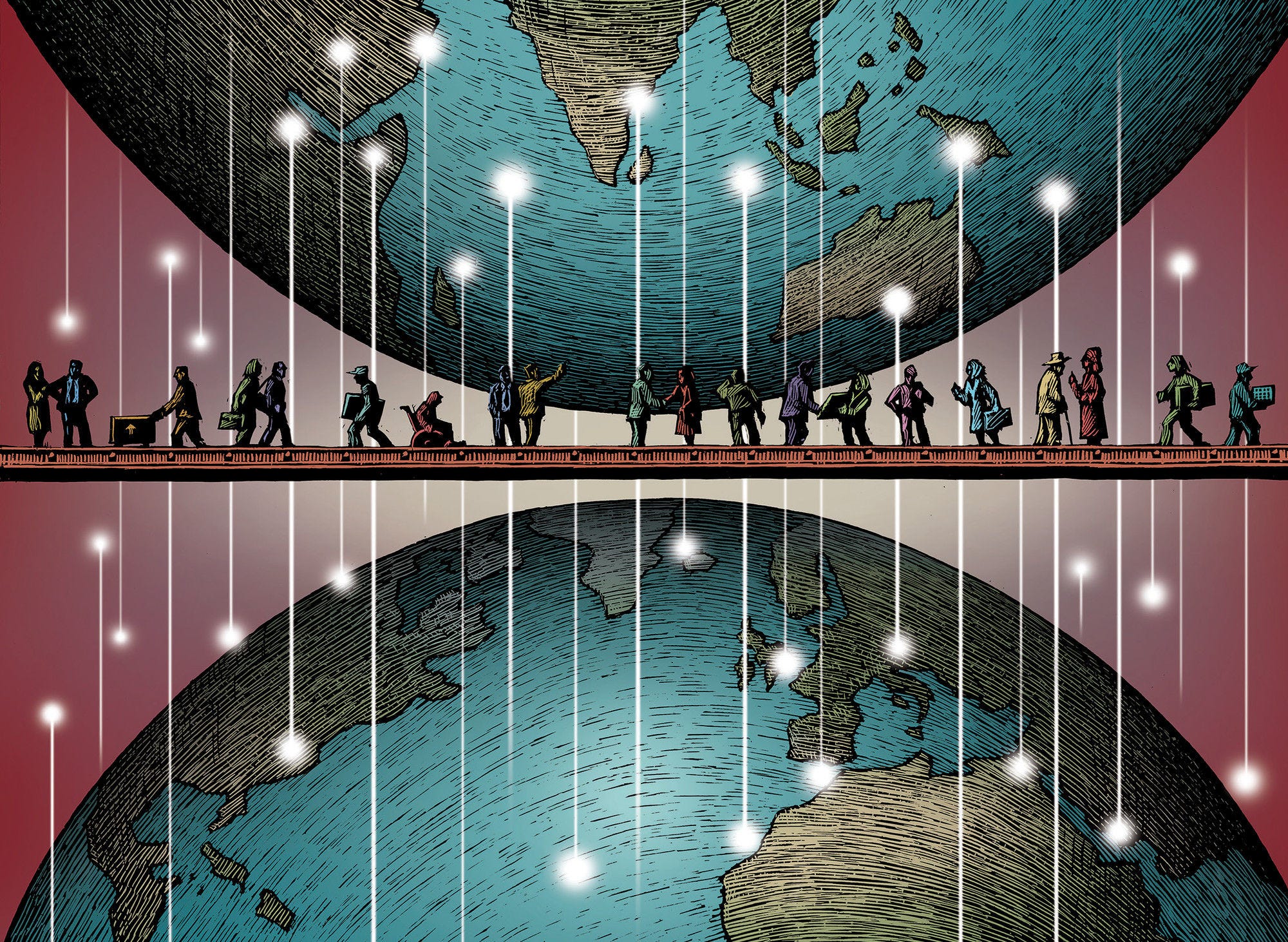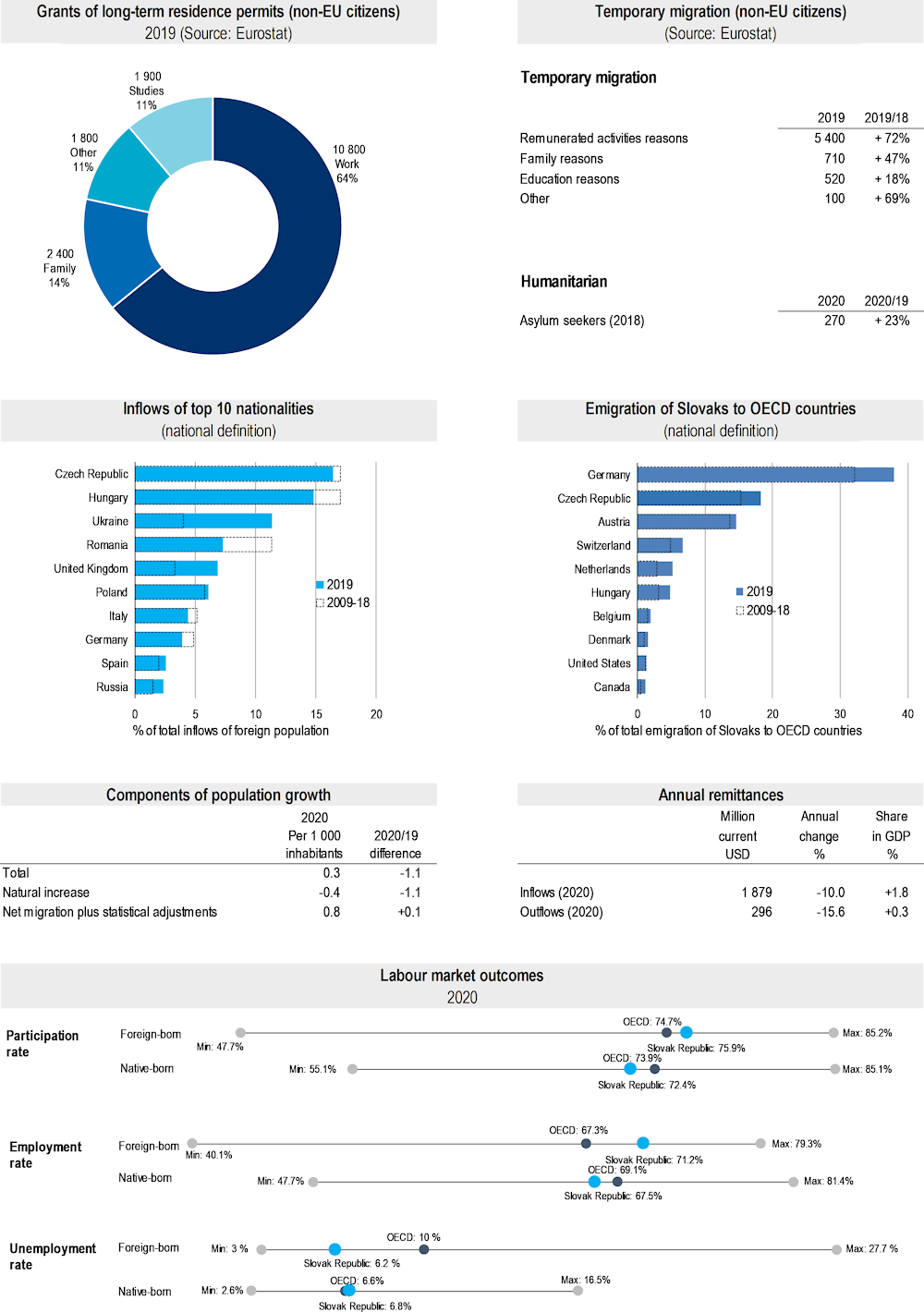In 2019, 22 000 new immigrants obtained a residence permit longer than 12 months in the Slovak Republic (excluding EU citizens), 30.8% more than in 2018. This figure comprises 70% labour migrants, 12.8% family members (including accompanying family), 10.8% who came for education reasons and 6.4% other migrants. Around 500 short-term permits were issued to international students and 5 400 to temporary and seasonal labour migrants (excluding intra-EU migration). In addition, 33 000 intra-EU postings were recorded in 2019, an increase of 140% compared to 2018. These posted workers are generally on short-term contracts.
The Czech Republic, Hungary and Ukraine were the top three nationalities of newcomers in 2019. Among the top 15 countries of origin, Ukraine registered the strongest increase (46) and Romania the largest decrease (‑200) in flows to the Slovak Republic compared to the previous year.
In 2020, the number of first asylum applicants increased by 23.3%, to reach around 300. The majority of applicants came from Afghanistan (50), Morocco (40) and Syria (35). The largest increase since 2019 concerned nationals of Morocco (35) and the largest decrease nationals of Afghanistan (‑35). Of the 80 decisions taken in 2020, 50% were positive.
Emigration of the Slovaks to OECD countries decreased by ‑5% in 2019, to 25 000. Approximately 23% of this group migrated to the Czech Republic, 22% to Germany and 18% to Austria.
In July 2018, the Act on the Residence of Foreigners reintroduced the law that a stateless person may obtain permanent residence for five years, instead of for an indefinite period as before. In addition, a stateless person may be granted permanent residence for five years as previously without fulfilling the conditions defined in the Act if they can prove that they do not have a citizenship of the state a) where they were born, b) where their previous domicile or residence was and c) have the citizenship of their parents and other family members.
In 2018 the Slovak Republic prepared a new national border control and management plan entitled “National Integrated Border Management Strategy for 2019 to 2022”. The document specifies new responsibilities for the Slovak Republic to undertake during the period as part of European Integrated Border Management.
In November 2018, the government approved the fifth National Programme to Combat Trafficking in Human Beings 2019 – 2023. Its main aim is to introduce a co‑ordinated system to limit the practice.
Changes to the Act on Employment in January 2019 updated the frequency of review of the shortage occupations list and imposed a general obligation on employers to report vacancies to the Office of Labour.
In 2019 the government started to update its integration policy with projects focusing on improving the integration of third-country nationals at the municipal level.
Also in 2019, changes were made in the Act on the Residence of Foreigners in connection with the exit of the United Kingdom from the EU. These changes came into force on 1 January 2020.
The Act on the Residence of Foreigners was amended from April 2020, to introduce transitional provisions related to the pandemic crisis. The validity of temporary residence, permanent residence or tolerated residence, expiring during the crisis or within one month from the revocation of the crisis regulations, was extended until two months have elapsed from the revocation. A third-country national (TCN) who legally entered the country and had not been granted residence under the Act was entitled to stay until one month after the end of the crisis. TCNs staying outside Slovak Republic during the crisis were allowed to apply for renewal of a temporary residence or for permanent residence for an indefinite period at the embassy.
With effect from 21 May 2020, The Act on Employment Services was amended to maintain the validity of granted temporary stays of TCNs. Validity of a vacancy certificate corresponding to a highly qualified job, a vacancy certificate and a work permit that would otherwise have expired during an emergency (or exceptional state declared in connection with COVID‑19) or within one month from the end of the emergency shall be extended until two months from the end of the emergency.
The Slovak Republic temporarily reintroduced border control of its internal borders with the Czech Republic, Austria, Hungary, Poland and at international airports from 8 April to 27 May 2020.
The temporary reintroduction of border control was subsequently prolonged to 11 June 2020 and after 11 June 2021 border control remained in effect at the internal border with Poland and at international airports until 26 June 2020.
For further information:

